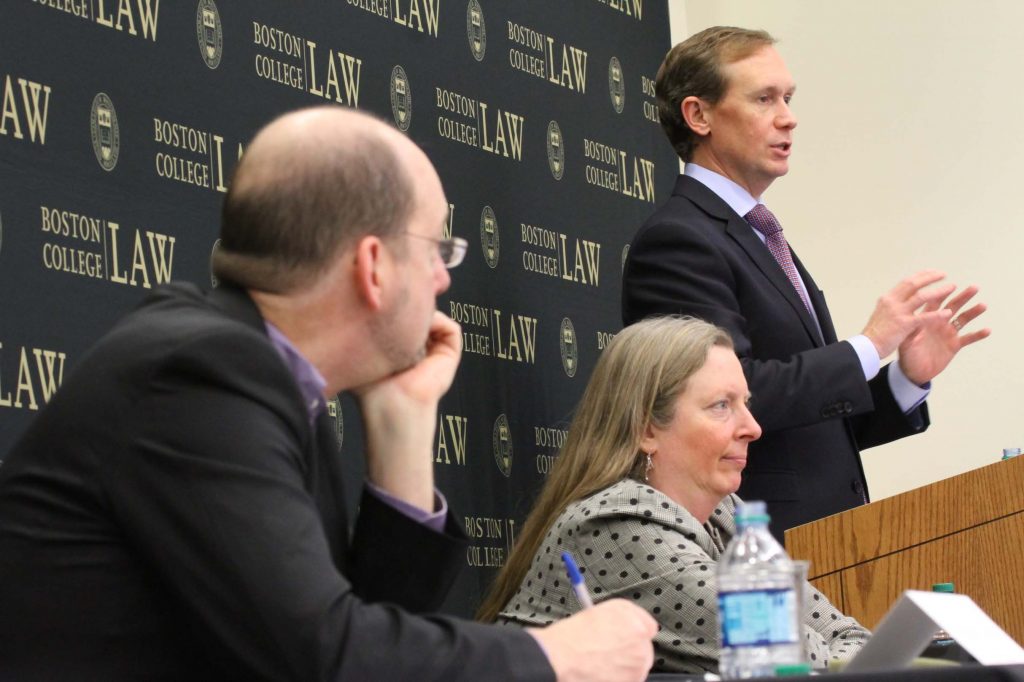Serving as a vital pillar supporting the modern market economy, intellectual property law often goes unrecognized in its importance. Very often the person who “owns” an idea “owns” the right to license the applications of that idea, and the rights to commodify and sell its resulting products. The exponential growth of the digital economy, with its emphasis on software rather than traditional “goods,” has lent urgency to the goal of adapting IP law to the modern world. Such were the concerns of a recent symposium at BC Law School.
Experts from BC Law, Suffolk University, Boston University, and the University of New Hampshire weighed in on this rapidly evolving field at a March 30 gathering at which recent developments and issues in IP law, and their potential impact on consumers and entrepreneurs alike, were topics of discussion.
The two panels centered around the changing paradigm of IP, from being rooted in the traditional UCC “sale of a good” concept to the development, along with the digital economy, of contracts limiting certain use. Traditionally, the UCC sale of a good also meant that the buyer received full rights of alienation and use. However, 21 years ago, “ProCD vs. Zeidenberg shifted the balance of power in mass-marketing contracting, particularly for information products, and remains perhaps the most important cornerstone for online contracting,” said Stephen Chow of Boston University. “The case gave court approval for the development of a ‘license’ as a contractual restriction on downstream use even without the invocation of traditional copyright protections.” But while licenses grew in popularity, courts continued to struggle with balancing what products were covered by the UCC definition of “good” and what products could be sold under new licensing agreements. Some courts “separated custom-made software as a licensable service from off-the-shelf software, which stayed an alienable good,” Professor Chow explained.
Another phenomenon of the software economy was the wrap contract, or terms that the consumer agreed to when he or she “broke the wrap” of a digital product. Their commonality in the End User Licensing Agreements has increased in importance. “Over the past 22 years, internet-handled telecommunication has increased from 1 percent to 97 percent,” said Professor Michael Rustad of Suffolk University.
Also known as “zombie contracts,” common clauses that waive the right to sue and that limit liability, necessary for the use of the product, have practically caused the end of modern contracting protections, said Chow. “Whereas there are legal duties to read a licensing agreement, there are no corresponding duties to make said agreement practically readable, causing an imbalance between company and consumer.”
The overwhelming use of terms and conditions for the use of any digital product or service, including many mobile apps such as Uber, has of late garnered a belated reaction from many courts, which are attempting to reassert their supervisory role over licensing agreements by extending to them the status of de-facto use contracts.
The second panel of the symposium covered the topic of copyright exhaustion, especially in the wake of the recent Supreme Court case Kirtsaeng v. John Wiley & Sons.
The University of New Hampshire’s Professor Ann Bartow described the significance of the case, in which, she said, “the court held that the first authorized sale of a good exhausted the seller’s copyright control of that good, even when imported. Essentially, the court declined to give copyright protections the same flexibility and control as a Licensing agreement.”
In reaction to Kirtsaeng, cases pertaining to patent law are working their way up the courts, petitioning for the same exhaustion rights. If the court were to apply Kirtsaeng to patent law, BC’s Professor David Olsen reflected, “IP rights holders who distribute digital goods will have to rely solely on the characterization of their transfers as licenses rather than sales to restrict resale and use their digital products. The result would be that IP-protected works could not be restricted after a first transfer.”
Commentators and courts are divided on the efficacy of further weakening IP protections and encouraging the continued growth of the licensing regime.
The conference, which was titled “20 Years after Pro-DC: Has Private Law Trumped Public Law in Intellectual Property,” was hosted by the Dean’s Office and organized by Professor Olsen.
Photograph, top, at the lectern: BC Law Professor David Olsen



